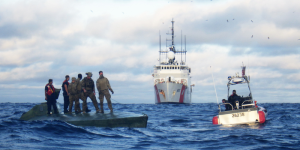Exclusive: Drug Trafficking In The Pacific
September 28, 2021 | Drug Crime
Daniel Toresen was recently involved in a high level corporate investigation where an employee appears to have smuggled millions of dollars worth of cocaine in a product shipment from a Pacific Island to Australia.
During this investigation, and subsequent security review work I conducted after the event, I learnt that this is a problem affecting many corporations in the Pacific and a trending problem in the pacific generally.
It is a particular worry for those corporations with shipments transiting the pacific to other countries such as New Zealand or Australia.
International crime syndicates are increasingly using the Pacific Island countries as gateways for smuggling drugs. Global narcos are increasingly preying on vulnerable Pacific Island countries to traffic drugs to funnel to lucrative markets like New Zealand and Australia.
This is due to the fact that Public officials in the region are poorly paid and therefore relatively easy to corrupt with mass volumes of money.
Organised crime is a serious risk to the Australian border and the Pacific is a "high priority" region.
The geographic positioning of Pacific Island countries such as Fiji and Tonga, midway between key source countries and lucrative drug markets, make them very attractive as staging areas for organised crime networks. This combined with Australia’s ties with Pacific Island countries makes their use as a transit point for drug consignment an area of awareness for Police.
Fiji and Papua New Guinea are most at risk because they are significant shipping hubs.
Cocaine trafficking to Australia is at a record high as traffickers are targeting local markets with tonnes of the drug which sells for up to $900 a gram.
In the six months to December 2015 alone, police seized more than 600kg of Cocaine at Australian borders and identified a further 632kg which was destined for the Australian market. The AFP also identified a further 600 kilograms seized in Tahiti and 32 kilograms of heroin found in Fiji as loads destined for the market in Australia.
Just last year the following trafficking shipments via the Pacific have been identified:
- In May 2018 The Mandana Drug Task Force seized about 15 Kilograms of cocaine which was the largest single drug bust in the Guam Police Department’s history.
- In June 2018 15 kilogrammes of cocaine and ecstasy tablets valued at $US10 to US$15 million was seized at Denarau port.
- The same month Tonga police seized 58 kilograms of cocaine with an estimated street value of US14.8 million dollars, during an operation in the Ha'apai Islands.
- In July 30 a total of 51 kilograms of cocaine an estimated street value of 43 million Fijian dollars was found on Taveuni Island, which is Fiji's third largest island.
In the year 2014-2015 significant cocaine seizures into Australia included:
- 20.6kg in crystal form concealed within multi-layered plastic bags, via air cargo from Colombia to Melbourne.
- 20kg on 4 March 2015, concealed inside a log splitter, via air cargo from the US to Sydney.
- 20kg on 19 April 2015 in a passenger’s bag from Chile to Sydney.
- 17.5kg on 12 October 2014 concealed in the rollers of a pastry machine via sea cargo from Hong Kong to Sydney.
- 16.9kg on 25 June 2015 concealed inside an air compression unit via air cargo from the US to Sydney.
The problem is not a new one, in 2004 Police dismantled a huge methamphetamine factory in Suva, seizing enough chemicals to make USD$540 million worth of the drug which was destined for markets in Europe, the United States, Australia and New Zealand. This was the largest methamphetamine laboratory ever discovered in the Southern Hemisphere.
The criminal gangs will bring the cocaine, in large volumes, by ship from either Mexico or South America and, when in the waters close to Fiji and Tonga etc., will drop the shipment overboard in rafts with a GPS locator beacon strapped to the “raft”. The local contacts in these countries will then travel out to sea by small boat and uplift the drugs. It is commonplace for rafts to missed or affected by adverse weather and break up leading to vast quantities of cocaine parcels literally washing up on the shores of outlying islands.
Once landed in these pacific countries the drugs are virtually useless due to the low levels of income and small population. The impetus is then to transfer these drugs to the lucrative markets such as New Zealand and Australia where the market is vast and eager for a steady supply of narcotics.
THE INVESTIGATORS PRIDE THEMSELVES ON BEING NEW ZEALAND'S LEADING PRIVATE INVESTIGATION FIRM.
IF YOU NEED HELP IN YOUR BUSINESS WITH A DRUG, THEFT OR FRAUD INVESTIGATION, CLICK HERE TO CONTACT US FOR A CONFIDENTIAL DISCUSSION.
Speak to an Investigator now - Call 0800 747 633.
